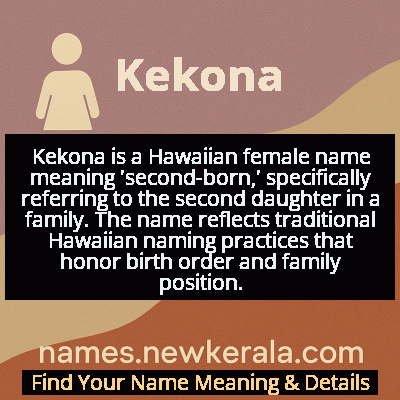Kekona Name Meaning & Details
Origin, Popularity, Numerology Analysis & Name Meaning of Kekona
Discover the origin, meaning, and cultural significance of the name KEKONA. Delve into its historical roots and explore the lasting impact it has had on communities and traditions.
Name
Kekona
Gender
Female
Origin
Hawaiian
Lucky Number
3
Meaning of the Name - Kekona
Kekona is a Hawaiian female name meaning 'second-born,' specifically referring to the second daughter in a family. The name reflects traditional Hawaiian naming practices that honor birth order and family position.
Kekona - Complete Numerology Analysis
Your Numerology Number
Based on Pythagorean Numerology System
Ruling Planet
Jupiter
Positive Nature
Optimistic, inspirational, and creative.
Negative Traits
Scattered, exaggerating.
Lucky Colours
Yellow, gold, purple.
Lucky Days
Thursday.
Lucky Stones
Yellow sapphire.
Harmony Numbers
1, 2, 9.
Best Suited Professions
Arts, writing, communication.
What People Like About You
Creativity, optimism.
Famous People Named Kekona
Kekona Kapahu
Cultural Practitioner
Preserved traditional Hawaiian hula and chant traditions during a period of cultural suppression
Kekona Naipo
Educator
Established Hawaiian language immersion programs in public schools
Kekona Kawa'a
Environmental Activist
Led successful efforts to protect native Hawaiian forests and watersheds
Name Variations & International Equivalents
Click on blue names to explore their detailed meanings. Gray names with will be available soon.
Cultural & Historical Significance
This naming practice demonstrates how Hawaiian culture values both individuality and one's role within the collective family and community. The preservation of such names represents the ongoing revitalization of Hawaiian language and cultural practices that were nearly lost during periods of colonization and cultural suppression. Today, names like Kekona serve as living connections to ancestral knowledge and cultural continuity, embodying the resilience of Hawaiian identity and the importance of preserving linguistic and cultural heritage for future generations.
Extended Personality Analysis
Individuals named Kekona are often described as reliable, supportive, and deeply connected to family traditions. As the name signifies 'second-born,' these individuals typically exhibit strong cooperative qualities, working well in team settings and often serving as the glue that holds groups together. They tend to be practical, grounded problem-solvers who approach challenges with patience and determination. Kekonas are frequently seen as the peacemakers in their families and social circles, possessing natural diplomatic skills and emotional intelligence that allows them to navigate complex relationships.
Their connection to their birth order often manifests in a strong sense of responsibility toward both older and younger siblings, making them excellent mediators and caretakers. While they may not always seek the spotlight, their steady presence and unwavering support make them invaluable members of any community. This inherent understanding of balance and relationship dynamics often leads Kekonas to excel in professions that require empathy, organization, and the ability to bring people together. Their strength lies in their consistency and their deep commitment to maintaining harmony within their personal and professional relationships.
Modern Usage & Popularity
In contemporary times, Kekona has experienced a resurgence as part of the broader Hawaiian cultural renaissance that began in the late 20th century. While not among the most common Hawaiian names, it is increasingly chosen by families seeking to honor traditional naming practices and connect their children to Hawaiian heritage. The name appears more frequently in Hawaii than on the mainland United States, though its usage remains relatively rare. Modern parents often select Kekona to celebrate the birth of their second daughter while simultaneously embracing cultural identity. The name's popularity reflects growing interest in authentic Hawaiian names that carry specific meanings and cultural significance rather than merely sounding Hawaiian. Social media and digital communities have also helped spread awareness of traditional Hawaiian names, contributing to their increased visibility and usage among younger generations both in Hawaii and in Hawaiian diaspora communities.
Symbolic & Spiritual Meanings
Beyond its literal meaning of 'second-born,' Kekona symbolizes continuity, balance, and the importance of one's place within a larger system. It represents the bridge between generations, carrying forward family traditions while supporting new growth. The name embodies the concept of 'ohana (family) in its deepest sense, emphasizing that each member has a unique and valuable role. Symbolically, Kekona suggests reliability, stewardship, and the quiet strength that comes from knowing one's position and purpose. It speaks to the Hawaiian value of kuleana (responsibility) and the understanding that individual identity is intrinsically linked to family and community relationships. The name also metaphorically represents the middle ground—the space between beginnings and endings, between leadership and followership—making it a powerful symbol of mediation, connection, and the essential role that every individual plays in maintaining the harmony of the whole.

